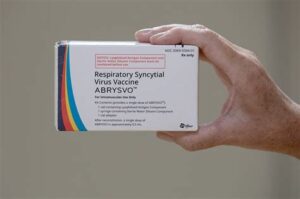Explore RSV vaccine side effects, including common short-term and longer-lasting reactions, management tips, and guidance on when to seek medical attention.As the development of vaccines continues to play a crucial role in public health, many are keen to understand the implications of receiving the RSV (respiratory syncytial virus) vaccine, particularly regarding its side effects. While vaccination is generally safe and effective, a key concern for recipients is how long the side effects might last. In this blog post, we will delve into the various side effects associated with the RSV vaccine, differentiating between common short-term reactions and those that may persist longer. Additionally, we’ll provide insight into effective management strategies for alleviating discomfort and inform you about when it’s important to seek medical attention. By staying informed, you can approach vaccination with confidence and peace of mind.
Understanding RSV Vaccine Side Effects
The Respiratory Syncytial Virus (RSV) vaccine has gained significant attention for its potential to prevent severe respiratory illnesses caused by RSV, particularly in vulnerable populations such as infants and the elderly. Like any vaccine, it is important to be aware of the side effects that might occur post-vaccination. Understanding these effects can help patients and their caregivers feel more at ease as they navigate the vaccination process.
Common short-term side effects of the RSV vaccine can include reactions at the injection site, such as redness or swelling. Other general symptoms may also appear, including fever, fatigue, and headaches. Typically, these short-term side effects manifest within the first few days following vaccination and usually resolve within a week. Properly managing any discomfort with over-the-counter pain relievers can significantly help in alleviating these symptoms.
In contrast, longer duration side effects are less common but can include persistent fatigue or muscle pain that may last longer than a week. It’s important to monitor these symptoms, as well as changes in health following vaccination. If side effects seem unusual or do not improve, discussing them with a healthcare provider is advisable to rule out any underlying issues.
Common Short-Term Side Effects
When individuals receive the RSV vaccine, they may experience a range of short-term side effects. Understanding these effects can help alleviate any concerns you might have after vaccination. While most side effects are mild and transient, they provide insight into how the body is responding to the vaccine.
- Pain or swelling at the injection site
- Fatigue or tiredness
- Headache
- Muscle or joint pain
- Fever or chills
- Nausea
These side effects typically arise within a few days of receiving the vaccine and usually resolve on their own within a week. It’s important to monitor your symptoms and avoid strenuous activities if you feel under the weather after receiving the vaccine. If you have any concerns about the RSV vaccine or its side effects, don’t hesitate to reach out to your healthcare provider.
Longer Duration Side Effects
The RSV vaccine has shown significant efficacy in preventing respiratory syncytial virus, particularly among infants and older adults. However, like any medical intervention, some individuals may experience side effects that last longer than the more common short-term reactions. Understanding these potential longer duration side effects is crucial for those considering vaccination.
Some individuals may report fatigue or mild muscle aches that linger for a few days to a week after receiving the vaccine. These symptoms are generally mild and can be managed with over-the-counter pain relief medications. In rare cases, more persistent side effects such as joint pain or headaches lasting up to several weeks have been documented. While these occurrences are uncommon, they are essential to acknowledge as part of the overall risk-benefit analysis of vaccination.
It’s important to keep track of any symptoms you experience after vaccination. If side effects persist longer than expected or worsen over time, it is advisable to consult with your healthcare provider for guidance. They can help rule out other conditions or suggest appropriate treatments to alleviate discomfort.
Managing and Alleviating Side Effects
After receiving the RSV vaccine, some individuals may experience side effects. It’s important to know that while these effects are typically mild, understanding how to manage and alleviate them can greatly enhance comfort and recovery.
- Resting: Giving your body ample time to recover can help reduce fatigue and discomfort.
- Hydration: Drinking plenty of fluids is essential, especially if you experience symptoms like fever or chills.
- Over-the-counter medications: Medications such as ibuprofen or acetaminophen can help relieve pain and fever. Always consult your healthcare provider before taking medications.
Additionally, applying a cool compress to the injection site can soothe soreness and swelling. It’s essential to follow any specific guidelines provided by your healthcare provider to ensure proper care during the recovery process.
When to Seek Medical Attention
After receiving the RSV vaccine, it’s essential to be aware of how to monitor your health for any side effects that may arise. While most side effects are usually mild and temporary, there are specific symptoms that warrant immediate medical attention.
- Severe allergic reactions (anaphylaxis) which may include difficulty breathing, swelling of the face or throat, rapid heartbeat, or a rash that covers a large area.
- High fever that persists over 101°F (38.3°C) or does not respond to over-the-counter medications.
- Persistent headache or blurry vision that disrupts daily activities.
- Unusual bruising or bleeding that is not typical for you.
It’s always better to err on the side of caution. If you have any concerns about your symptoms or feel that they are not resolving, seeking medical attention promptly can ensure your safety and well-being. Therefore, maintaining communication with your healthcare provider after vaccination is highly recommended.
Frequently Asked Questions
What are the common side effects of the RSV vaccine?
Common side effects of the RSV vaccine can include soreness at the injection site, mild fever, fatigue, and headache.
How long do side effects typically last after receiving the RSV vaccine?
Most side effects of the RSV vaccine usually last from a few days up to a week.
Are there any severe side effects associated with the RSV vaccine?
Severe side effects are rare, but they can include allergic reactions. It’s important to discuss any concerns with a healthcare provider.
Can the duration of side effects vary between individuals?
Yes, the duration and severity of side effects can vary based on individual health, age, and other factors.
What should I do if I experience prolonged side effects from the RSV vaccine?
If side effects persist beyond a week or become severe, it is advisable to consult a healthcare professional.
Is it normal to feel fatigued after getting the RSV vaccine?
Yes, fatigue is a common side effect and is typically temporary, lasting a few days.
How can I manage the side effects of the RSV vaccine?
Over-the-counter pain relievers, rest, and hydration can help manage mild side effects.





